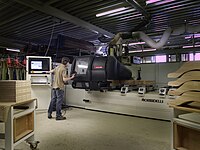
Experimental research on drying control condition with minimal effect on concrete strength
Sign Up to like & getrecommendations! Published in 2017 at "Construction and Building Materials"
DOI: 10.1016/j.conbuildmat.2016.12.141
Abstract: Abstract In order to obtain the drying control condition with no or minimal effect on concrete strength, various drying temperatures conditions are used as 150 °C, 120 °C, 105 °C, 85 °C and 60 °C, and the drying procedure of… read more here.
Keywords: strength; control condition; condition minimal; drying control ... See more keywords

Compared to an active control condition, in persons with multiple sclerosis two different types of exercise training improved sleep and depression, but not fatigue, paresthesia, and intolerance of uncertainty.
Sign Up to like & getrecommendations! Published in 2019 at "Multiple sclerosis and related disorders"
DOI: 10.1016/j.msard.2019.07.032
Abstract: BACKGROUND In persons with multiple sclerosis (MS), physical activity favorably impacts on psychological well-being. The aims of the present study were to investigate the influence of physical activity on depression, fatigue, sleep, paresthesia, and personality… read more here.
Keywords: control condition; control; training; active control ... See more keywords

Modulation of subjective peripheral sensation, F-waves, and somatosensory evoked potentials in response to unilateral pinch task measured on the contractile and non-contractile sides
Sign Up to like & getrecommendations! Published in 2022 at "PLoS ONE"
DOI: 10.1371/journal.pone.0261393
Abstract: Depression of the sensory input during voluntary muscle contractions has been demonstrated using electrophysiological methods in both animals and humans. However, the association between electrophysiological responses of the sensory system and subjective peripheral sensation (SPS)… read more here.
Keywords: sensation; hand; task; control condition ... See more keywords

An electrophysiological exploration of modifiers embedded in different hierarchies: Insight from short passives in Mandarin
Sign Up to like & getrecommendations! Published in 2023 at "Brain Research"
DOI: 10.2139/ssrn.4134217
Abstract: This event-related potentials study explored the processing of Mandarin short passives. We used a syntactic violation paradigm to compare the processing of two auxiliary phrases (i.e., a verb-modifier di-phrase and a noun-modifier de-phrase). In the… read more here.
Keywords: condition; violation; phrase; control condition ... See more keywords

Social Support Modulates Neural Responses to Unfairness in the Ultimatum Game
Sign Up to like & getrecommendations! Published in 2018 at "Frontiers in Psychology"
DOI: 10.3389/fpsyg.2018.00182
Abstract: The current functional MRI study aimed to investigate how responders’ fairness considerations and related decision-making processes were affected by social support in the ultimatum game (UG). During scanning, responders either played the standard UG with… read more here.
Keywords: social support; control condition; support; ultimatum game ... See more keywords

Acute Effects of a Single Bout of Walking on Affective Responses in Patients with Major Depressive Disorder
Sign Up to like & getrecommendations! Published in 2021 at "International Journal of Environmental Research and Public Health"
DOI: 10.3390/ijerph18041524
Abstract: Exercise programs are considered an effective (add-on) treatment option for depressive disorders. However, little is known about the acute effects of exercise on affective responses in in-patient settings. Therefore, the aim of the present study… read more here.
Keywords: control condition; depressive disorder; condition; major depressive ... See more keywords

Masking interferes with haptic texture perception from sequential exploratory movements
Sign Up to like & getrecommendations! Published in 2021 at "Attention, Perception & Psychophysics"
DOI: 10.3758/s13414-021-02253-w
Abstract: Haptic texture perception is based on sensory information sequentially gathered during several lateral movements (“strokes”). In this process, sensory information of earlier strokes must be preserved in a memory system. We investigated whether this system… read more here.
Keywords: control condition; information; texture perception; perception ... See more keywords